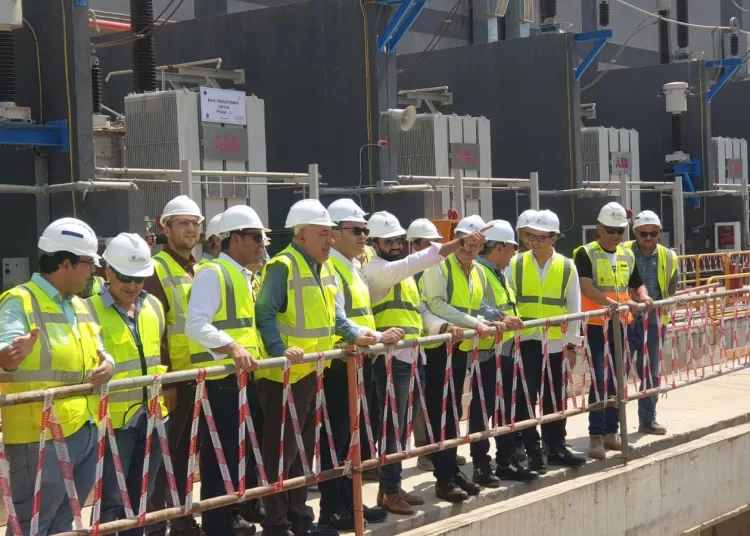Egypt has well-defined and actionable plans for collaborative projects with several Nile Basin countries.
It supported South Sudan in various water infrastructure projects, ones that aim to provide South Sudanese citizens with access to clean water.
These projects include rainwater reservoirs, gauging and discharge stations, and flood forecasting and early warning centres.
Tanzania’s Julius Nyerere Hydroelectric Power Project, the African country’s mega national project, is constructed by an Egyptian consortium. The project is 97.74% complete, according to the Egyptian Ministry of Housing.
The dam, with a length of 1,025 metres and a storage capacity of about 34 billion cubic metres, aims to double Tanzania’s energy production, controlflooding, and improve agriculture.
The project, which has been under construction since 2019, is implemented through a joint venture of two Egyptian companies: the state-owned Arab Contractors and the privately owned el-Sewedy Electric.
7th CWW
Water and climate share an intricate relationship. Proper dealing with them forms the bedrock for the establishment of sustainable and resilient communities.
The seventh Cairo Water Week (CWW) 2024, which ended on Thursday, takes centre stage in this regard, underscoring the crucial role of water management in addressing the escalating impacts of climate change.
In a world where climate patterns grow increasingly erratic, communities globally confront heightened risks, including floods, droughts, and extreme weather events that challenge their very foundations.
The imperative to build resilience necessitates a comprehensive approach that seamlessly integrates water resource management, infrastructure development, and active community engagement.
Effective strategies in this endeavour involve, not only the construction of resilient water systems, but also the implementation of eco-friendly practices.
Additionally, the establishment of early warning systems becomes paramount to enhance community preparedness in the face of unpredictable climatic shifts.
These multifaceted measures collectively contribute to the creation of resilient communities capable of navigating the challenges posed by the evolving climate.
CWW 2024, themed “Water and Climate: Building Resilient Communities,” becomes a pivotal platform where experts, policymakers, and stakeholders converge to explore innovative solutions and collaborative initiatives.
The event has solidified itself as a key water event in the Middle East and worldwide, drawing attention from stakeholders who recognise water’s vital role in life.
Over time, CWW has evolved into a significant international forum, serving as a primary platform in the Middle East and Africa for constructive dialogue on pressing water issues.
This year’s event explored the intricate relationship between water and climate, emphasizing their collective impact on community resilience.
Discussions extended beyond recognition, delving into the need for sustainable and adaptive practices that fortify communities against the challenges of climate change and water scarcity.
The overarching goal is to construct water and climate resilient communities, ensuring equitable access to clean and safe water, empowering people to thrive amidst evolving environmental conditions.
Water projects
Around 19% of the concessional development financing allocated by international partners is directed towards water projects across Egypt, Minister of Planning, Economic Development, and International Co-operation, Rania al-Mashat, said recently.
These projects aim to achieve Sustainable Development Goal 6 (SDG6): Clean water and sanitation for all.
“Egypt has been carrying out a series of these projects, to enhance national capacities and addresswater security challenges, such as the Bahr el-Baqar wastewater treatment plant, water desalination projects, and water and wastewater services projects,” Minister al-Mashat said.
Sea water desalination projects
Meanwhile, the International Finance Corporation (IFC), the Sovereign Fund of Egypt (TSFE), and the European Bank for Reconstruction and Development (EBRD) have partnered to boost the supply of safe drinking water through a public-private partnership (PPP) that will develop the first batch of seawater desalination plants in the country.
Under the partnership, IFC and EBRD will jointly advise TSFE to structure the development of desalination plants under a PPP model.
The private sector will be competitively selected to design, finance, build, operate, and maintain the plants.
The project is part of Egypt’s strategy to increase the desalinated water supply by 8.8 million cubic metres of daily by 2050.
The initial plants, located in the Mediterranean governorate of MarsaMatrouh, will mainly benefit the residents of the governorate as well as adjacent areas on Egypt’s North Coast.
AWARe initiative
Minister al-Mashatreferred to the Action on Water Adaptation or Resilience (AWARe) initiative Egypt launched during COP27 in 2022 to address water and climate-related challenges at the global level.
The initiative focuses on developing countries most affected by climate change, by supporting on-ground project implementation efforts.
It builds on the Water and Climate Coalition, the Adaptation Action Coalition as well as the Marrakesh Partnership Climate Action Pathway Water. The Egyptian government works hard to offer the necessary funding for water sector adaptation projects, being necessary for the achievement of sustainable development






Discussion about this post